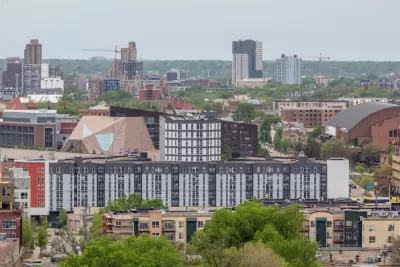Minneapolis joins the avant garde of cities implementing a dramatic overhaul of the parking requirement status quo that has been a primary determinant of the form and function of cities for nearly a century.

"The Minneapolis City Council voted unanimously Friday to eliminate minimum parking requirements on new developments citywide," reports Zoë Jackson.
The new citywide parking requirements are set to take effect this week after the 13-0 by the City Council. The change also "makes Minneapolis the largest Midwest city to abandon parking requirements and one of just a handful in the United States," adds Jackson.
In addition to removing parking requirements for new development citywide, the ordinance "also includes an increase in bicycle parking requirements and will add new travel demand management (TDM) strategy requirements to more buildings, including every residential building with 50 or more units."
Jackson notes that although parking requirements have been eliminated, developers still have the choice to build parking with new developments, just with more flexibility.
City Council President Lisa Bender offers a soundbite in the article that ties the parking reform vote to climate and emissions goals set by the Minneapolis 2040 Comprehensive Plan. As for the advocacy that helped bring this historic moment to fruition, Jackson provides this anecdote:
Minneapolis Planning Commissioner Chris Meyer has been pushing for the elimination of parking requirements since he was a student at the University of Minnesota in 2011. In 2015, he bought 13 copies of "The High Cost of Free Parking" by Donald Shoup for each council member. Later that year, minimums near transit were eliminated.
Minneapolis is in the lead in the parking reform movement in the Midwest, but several other U.S. cities have already removed parking requirements, like Buffalo, San Diego, and San Francisco. Houston and Los Angeles removed parking requirements in specific neighborhoods. Nearby St. Paul is in earlier stages of reconsidering the parking requirements in its zoning code, as detailed in a Planetizen post from earlier this month. Other cities around the country are at various stages of the process of removing some or all parking requirements, including Berkeley, Dallas, Seattle, and Raleigh, among others.
FULL STORY: Minneapolis City Council unanimously eliminates parking requirements

Planetizen Federal Action Tracker
A weekly monitor of how Trump’s orders and actions are impacting planners and planning in America.

Chicago’s Ghost Rails
Just beneath the surface of the modern city lie the remnants of its expansive early 20th-century streetcar system.

San Antonio and Austin are Fusing Into one Massive Megaregion
The region spanning the two central Texas cities is growing fast, posing challenges for local infrastructure and water supplies.

Since Zion's Shuttles Went Electric “The Smog is Gone”
Visitors to Zion National Park can enjoy the canyon via the nation’s first fully electric park shuttle system.

Trump Distributing DOT Safety Funds at 1/10 Rate of Biden
Funds for Safe Streets and other transportation safety and equity programs are being held up by administrative reviews and conflicts with the Trump administration’s priorities.

German Cities Subsidize Taxis for Women Amid Wave of Violence
Free or low-cost taxi rides can help women navigate cities more safely, but critics say the programs don't address the root causes of violence against women.
Urban Design for Planners 1: Software Tools
This six-course series explores essential urban design concepts using open source software and equips planners with the tools they need to participate fully in the urban design process.
Planning for Universal Design
Learn the tools for implementing Universal Design in planning regulations.
planning NEXT
Appalachian Highlands Housing Partners
Mpact (founded as Rail~Volution)
City of Camden Redevelopment Agency
City of Astoria
City of Portland
City of Laramie





























